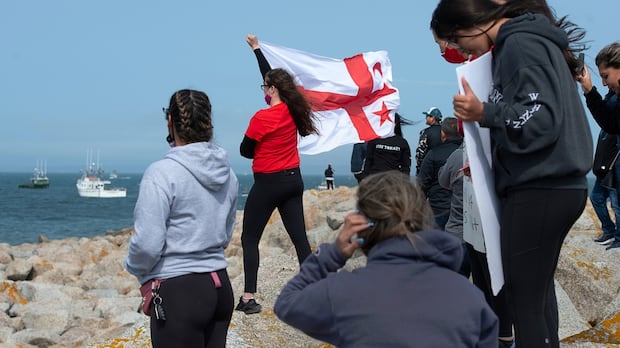Nova Scotia·NewA judge has turned down a request from a commercial fishing group to order a Nova Scotia First Nation to pay roughly $334,000 in legal costs stemming from a treaty rights lawsuit the band launched over its lobster fishery but ultimately abandoned earlier this year.Unified Fisheries Conservation Alliance claimed $334K in costs after band discontinued treaty rights caseRichard Cuthbertson · CBC News · Posted: Oct 30, 2025 2:35 PM EDT | Last Updated: 20 minutes agoListen to this articleEstimated 5 minutesMembers of the Sipekne’katik First Nation, supported by other First Nations, stand on the breakwater in Saulnierville, N.S., as non-Indigenous boats protest the launch of the Mi’kmaw self-regulated fishery on Sept. 17, 2020. (Andrew Vaughan/The Canadian Press)A judge has turned down a request from a commercial fishing group to order a Nova Scotia First Nation to pay roughly $334,000 in legal costs stemming from a treaty rights lawsuit the band launched over its lobster fishery but ultimately abandoned earlier this year.Nova Scotia Supreme Court Justice John Keith on Thursday called the costs claimed by the Unified Fisheries Conservation Alliance “extremely excessive” and ordered Sipekne’katik First Nation to pay the group the more modest sum of $15,000.The Mi’kmaw band filed its lawsuit against the federal government in 2021, claiming the Fisheries Act and its regulations criminalized the First Nation’s treaty-based fishing rights and trading activities, according to Keith.The band has conducted a lobster fishery outside federal regulations in the summer and fall in St. Marys Bay in southwest Nova Scotia. It has been a source of tension in the area, and has been opposed by many non-Indigenous commercial fishermen and groups.The UFCA was granted intervener status in the Sipekne’katik lawsuit, but the band discontinued its legal action in June, right on the eve of discovery — the process where prospective witnesses were to be questioned. It was the second time discovery had been cancelled at the last minute.Sipekne’katik First Nation fishing boats are seen from the wharf in Saulnierville, N.S., in this file photo from 2020. (Eric Woolliscroft/CBC)In asserting its right to the fishery, the band has cited the 1999 Supreme Court of Canada decision that found a Mi’kmaw fisherman, Donald Marshall Jr., had a treaty right to earn a “moderate livelihood” by catching and selling eels he had caught outside the commercial season.On Thursday, Keith discussed the Marshall decision and a subsequent second decision in the case that year, noting the Supreme Court stated that issues involving other fisheries, such as lobster, could be decided in future cases, but it hoped they might be resolved by negotiation.“And so the seeds of this current dispute were sown, unfortunately,” Keith said. “Twenty-six years later, no clear resolution has been achieved. The issues that rose to the surface in 1999 still exist and have generated considerable tension over the intervening years.”Sipekne’katik has said in court documents that it ended its lawsuit in part because some progress had been made in negotiations with the federal government. But it also cited a litigation bill that had mounted to at least $572,073.The band said it’s not wealthy and its legal costs were taking money from important programs. It argued if it was ordered to pay the UFCA’s costs, it would “set a precedent of the worst kind and chill future Aboriginal and treaty rights litigation in Nova Scotia.”The UFCA had initially sought legal costs of $400,000, but subsequently reduced that to $334,000 during a court hearing last month. The Law Courts building in downtown Halifax is shown. (Robert Short/CBC)Keith said it’s clear the UFCA had a direct interest in the proceedings, “particularly given the broad social, environmental and economic issues at play.” He noted the lawyer for the federal government said the Crown could not speak on behalf of non-Indigenous groups in the case. Michel Samson, one of the lawyers for the UFCA, said in an interview that Keith recognized the group as an entity that represents the commercial lobster industry, a point that will be important in other legal actions, including one seeking a declaration that Sipekne’katik’s fishery is unlawful.“For us, it’s a major victory for the UFCA in the fact that Justice Keith affirmed that we have a direct and meaningful interest and questions around First Nation rights and equitable sharing of the fishery resource,” Samson said.Stuart Knockwood, the band’s executive director of administration who was in court Thursday, declined an interview request. Chief Michelle Glasgow did not immediately respond to an interview request.Keith said he was “sympathetic” to the chilling effect argued by Sipekne’katik, but also believed the band should pay something because the UFCA had twice prepared for discoveries that were cancelled, “resulting in unnecessary and avoidable waste and delay.”Still, he had “extreme concerns” with the amount in legal costs being claimed by the UFCA, and said there were numerous issues with the invoices submitted, pointing in part to the lack of detail of those from lawyer Alex Cameron, who was co-counsel for the group in the case.The group said it paid $86,837.50 to Cameron, a former provincial government lawyer critical of the Marshall decision who abruptly retired from the public service in 2017 and claimed constructive dismissal following a controversy involving another Sipekne’katik case.MORE TOP STORIESABOUT THE AUTHORRichard Cuthbertson is a journalist with CBC Nova Scotia. He can be reached at richard.cuthbertson@cbc.ca.
Judge calls fishing group’s legal cost claims ‘excessive,’ orders Sipekne’katik to pay $15K











